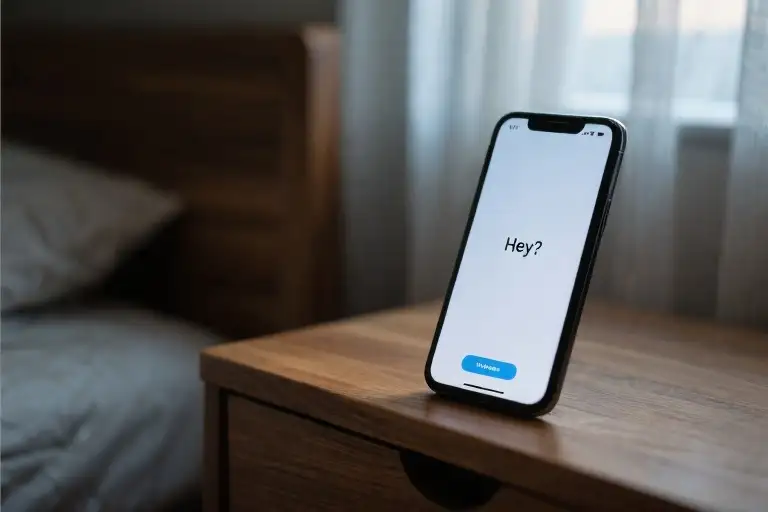The floor feels colder when you’re curled up crying. Your phone screen burns brighter when you’re staring at their name, praying for a notification that never comes. You draft messages at 2 AM – paragraphs of anger, love, confusion – only to delete them all before sunrise.
Then one ordinary Tuesday, it happens. You’re laughing with friends about something stupid, your stomach actually hurts from joy, and for the first time in months you didn’t check your phone for hours. That’s when it buzzes. A single word glows on the screen: “Hey…”
Why is it always at this precise moment – when you’ve finally glued yourself back together – that they reappear with their casual breadcrumbs? No explanations. No accountability. Just enough presence to make you wonder if all that healing was for nothing.
This isn’t just your story. A 2021 study in the Journal of Social and Personal Relationships found 44% of people admit to reaching out to exes “out of the blue,” often long after moving on. That text you got wasn’t random. It wasn’t fate. It was psychology playing out in real time.
What they’re really responding to isn’t you – it’s the absence of you they can finally feel. Your genuine smile became a mirror showing them what they lost. Your rebuilt peace became a door they can no longer walk through whenever they please. That unforced laughter? It’s the ultimate rejection – proof you’ve created a world where their name doesn’t matter anymore.
The cruel irony? The very work you did to move on is what pulled them back. But here’s what that text really means: You won. The game wasn’t making them want you – it was becoming someone who didn’t need them to want you. And now, whether you reply or not, you get to decide what happens next.
The 44% Phenomenon: When Exes Circle Back
That moment when your phone lights up with their name after months of silence—it’s not just your imagination playing tricks. A 2021 study in the Journal of Social and Personal Relationships found that 44% of people admit to reaching out to an ex “randomly,” often long after the relationship ended. The kicker? Most of these messages arrive precisely when you’ve stopped checking for them.
Take Rachel’s story: two years post-breakup, when her travel blog started gaining traction and she’d finally deleted his contact, a notification popped up—a like on her anniversary post from 2018. Or Mark, who received a “Hey stranger” text the week he moved into his dream apartment. These aren’t coincidences; they’re data points in a pattern psychologists recognize all too well.
What’s fascinating isn’t just that exes reappear—it’s when they choose to do so. The study participants overwhelmingly reported contacts occurring during milestones: new jobs, weight loss achievements, or when social media showed the ex happily solo. This timing reveals an uncomfortable truth: your growth doesn’t just happen to you. Someone’s always watching from the periphery, recalibrating their assumptions about your availability.
But here’s what the 44% statistic really means: if you’re staring at that unexpected message wondering “Why now?”, you’re standing where nearly half the population has stood before. That ping isn’t about your worth—it’s about their changed perception of it. As the research shows, this behavior says less about lingering feelings and more about basic human psychology reacting to perceived scarcity.
Which brings us to the quiet victory hidden in these numbers. That 44% didn’t reach out to people drowning in grief—they contacted those who’d learned to swim. Your healing didn’t go unnoticed; it became the very thing that made them look twice.
So when science says this happens to almost half of us, it’s also saying something far more important: their return isn’t about you doing something wrong. It’s proof you did something right.
The Psychology Behind Their Return: Why Your Healing Scares Them
There’s a peculiar cruelty to the timing. Just as you finally stop checking your phone for their name, just as your mornings no longer begin with that hollow ache – that’s when they reappear. A casual text. A nostalgic comment. An unexpected ‘thinking of you’ that arrives precisely when you’ve stopped thinking of them.
This isn’t coincidence. It’s human psychology playing out in its most predictable – and frustrating – patterns.
Loss Aversion: The Panic of Permanent Goodbye
We’re wired to fear loss more than we desire gain. Behavioral economists call this loss aversion, but anyone who’s ever scrambled to retrieve a deleted text understands it instinctively. For months, your ex operated with the unspoken assurance that you remained available in their emotional orbit. Your pain, while heartbreaking, was strangely comforting to them – proof they still mattered.
Then something shifted. Maybe they noticed your Instagram stories showing genuine laughter. Perhaps mutual friends mentioned you’d taken up salsa dancing. The realization dawns: you’re moving on without them. Suddenly, what seemed like a stable backup option threatens to become permanent loss – and the human brain hates nothing more than finality.
The Shattered Mirror: When You Stop Needing Them
Relationships create intricate systems of validation. For some people, being needed becomes part of their identity. Your healing disrupts this delicate equilibrium. Where once they saw reflection of their importance (your sadness proving their impact), now they confront something far more unsettling – your happiness existing independently of them.
This explains why breadcrumbing often begins after you post vacation photos or career achievements. It’s not about missing you – it’s about their discomfort with no longer being central to your narrative. The person who once said ‘I need space’ now panics at seeing you actually take it.
The Power Shift You Didn’t See Coming
Every relationship has invisible currents of emotional supply and demand. Post-breakup, the rejector typically holds more power – until the rejected party stops seeking validation. Your indifference (or more accurately, your self-sufficiency) flips the script. Now they’re the ones wondering why you haven’t called. Now they’re the ones questioning their own desirability.
This dynamic explains why exes often return when you’re dating someone new. It’s rarely about jealousy – it’s about confronting the uncomfortable truth that you’ve found alternative sources of happiness. Their sudden outreach becomes less about reconnection and more about reasserting their continued relevance in your emotional economy.
The irony? The very things that finally make you attractive again – your independence, your healed heart – are the qualities that made the relationship unsustainable in the first place. Which is perhaps the most important lesson hidden in these painful patterns: if someone only wants you when you don’t need them, what they’re chasing isn’t love – it’s validation.
When That Message Pops Up: Guarding Your Peace
That moment when their name flashes on your screen—it sends a jolt through your body, doesn’t it? Your thumb hovers over the notification, caught between curiosity and self-preservation. This is the critical juncture where most of us make emotional decisions we later regret. Let’s change that pattern.
The Intent Filter: Decoding Their Words
Not all “Hey” messages are created equal. Some exes reach out with vague nostalgia (“Remember when we…?”), others with convenient loneliness (“Just checking in”), and a rare few with clear intentions (“I’ve changed and would like to talk”). Train yourself to spot the difference:
- Breadcrumb messages: No questions, no plans, just emotional fishing (“Saw this meme and thought of you”). These often indicate boredom or ego validation.
- Concrete messages: Specific requests with accountability (“Could we meet for coffee? I owe you an apology”). These warrant more consideration.
Ask yourself: “If I removed my history with this person, would this message still deserve a response?” The answer usually becomes obvious.
The 24-Hour Rule: Your Emotional Airbag
We’ve all been there—firing off a reply while emotions run high, only to cringe reading it the next day. Implement this simple buffer:
- When the message arrives, note the time.
- Close your phone. Do something grounding (walk, call a friend, journal).
- If after 24 hours you still feel compelled to respond, draft your reply in Notes first.
This pause accomplishes two things: It prevents knee-jerk reactions, and reveals whether their message actually merits your energy. Most “urgent” ex communications lose their power when left unanswered for a day.
The Self-Inventory: Why Reply At All?
Before typing anything, confront these uncomfortable questions:
- Am I responding because I’m lonely tonight, or because this person genuinely aligns with my future?
- If they disappeared again after this conversation, would I regret engaging?
- Is there information here that actually serves my growth, or am I hoping for some emotional payoff?
Keep a sticky note with your post-breakup realizations nearby when replying. That list of “why we ended” matters more in this moment than any nostalgic ping from your past.
Remember: You don’t owe anyone access to your peace. Not even someone who used to hold your heart. The healthiest response sometimes lives in the silence you choose to keep.
The Real Victory
The moment you stop checking your phone for their name—when you finally forget to wonder what they’re doing on a rainy Tuesday afternoon—that’s when life begins to whisper a secret in your ear. You realize the storm has passed not when the skies clear, but when you notice you’ve stopped carrying an umbrella everywhere.
True healing isn’t about indifference; it’s the quiet understanding that their presence or absence no longer dictates your weather. That text message popping up after months of silence? It’s just words on a screen now, not a seismic event threatening to crack your foundation.
“The real victory isn’t ignoring their return—it’s realizing you don’t need to.”
When exes come back after no contact, it often says more about their journey than yours. Your peace became the mirror that showed them what they lost. Your laughter became the evidence that life continues beautifully without them. That’s why psychology suggests exes reach out when you’ve moved on—your emotional independence disrupts their assumed narrative.
So if you’re reading this with his “Hey…” still glowing in your notifications, ask yourself just one question: Does replying feel like stepping backward or walking forward? Either answer is valid, as long as it’s yours alone.
We all have our stories—what happened when your ex came back? Share anonymously below.





